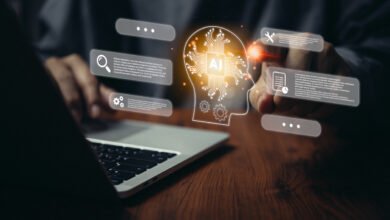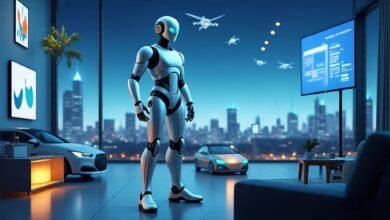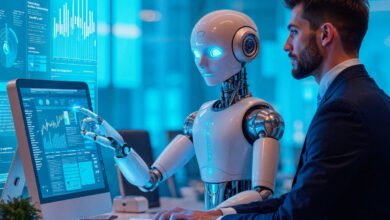How Quantum Computing Will Revolutionize AI Technology
Discover how quantum computing will revolutionize AI technology. Learn about quantum AI applications, machine learning breakthroughs, and future

Revolutionize AI Technology, and artificial intelligence represents one of the most transformative technological developments of our era. As we stand on the precipice of a computational revolution, quantum AI promises to unlock unprecedented capabilities that could reshape industries, accelerate scientific discovery, and solve previously intractable problems. This groundbreaking fusion combines the probabilistic nature of quantum mechanics with the pattern recognition prowess of AI, creating a synergy that transcends the limitations of classical computing.
Quantum computing technology operates on fundamentally different principles than traditional computers, leveraging quantum phenomena such as superposition and entanglement to process information in ways that classical systems cannot. When integrated with machine learning algorithms, this creates quantum-enhanced AI systems capable of analyzing vast datasets, optimizing complex problems, and making predictions with remarkable accuracy and speed.
The implications extend far beyond theoretical possibilities. Major technology companies like Google, IBM, and Microsoft are investing billions in quantum AI research, while startups and academic institutions worldwide race to develop practical applications. From drug discovery and financial modeling to climate simulation and cybersecurity, quantum-enhanced AI is poised to revolutionize how we approach computational challenges across virtually every sector.
This technological convergence isn’t merely an incremental improvement—it represents a paradigm shift that could democratize access to computational power previously reserved for the most advanced supercomputers. As quantum processors become more sophisticated and quantum algorithms mature, we’re witnessing the emergence of hybrid classical-quantum systems that harness the strengths of both approaches.
The journey ahead is filled with both unprecedented opportunities and significant challenges, from hardware limitations and error correction to the need for specialized expertise and new programming paradigms. Understanding this quantum-AI revolution is crucial for businesses, researchers, and technology enthusiasts preparing for a future where the impossible becomes achievable.
Quantum Computing Fundamentals
Quantum computing represents a revolutionary departure from classical computational methods, operating on the bizarre yet powerful principles of quantum mechanics. Unlike traditional bits that exist in binary states of 0 or 1, quantum bits (qubits) can exist in superposition, simultaneously representing both states until measured. This fundamental difference enables quantum computers to process exponentially more information than classical systems.
The power of quantum processors lies in their ability to leverage three key quantum phenomena. Quantum superposition allows qubits to exist in multiple states simultaneously, dramatically expanding computational possibilities. Quantum entanglement creates mysterious correlations between qubits, enabling instantaneous information sharing regardless of physical distance. Quantum interference allows quantum algorithms to amplify correct answers while canceling out incorrect ones, enhancing computational accuracy.
Modern quantum hardware employs various technologies to maintain quantum states. Superconducting qubits, used by companies like Google and IBM, operate at temperatures colder than deep space to minimize environmental interference. Trapped ion systems use electromagnetic fields to manipulate individual atoms, while photonic quantum computers utilize light particles for information processing. Each approach offers unique advantages for different quantum applications.
Quantum algorithms differ fundamentally from classical programming approaches. Shor’s algorithm demonstrates quantum computing’s potential for cryptography by efficiently factoring large numbers, while Grover’s algorithm provides a quadratic speedup for searching unsorted databases. These specialized algorithms showcase how quantum advantage emerges from exploiting quantum properties rather than simply increasing processing speed.
The current state of quantum computing technology remains in its early stages, often described as the “NISQ era” (Noisy Intermediate-Scale Quantum). Today’s quantum computers contain dozens to hundreds of qubits but struggle with error rates and coherence times. However, recent breakthroughs like Google’s Willow chip demonstrate significant progress in quantum error correction, bringing us closer to fault-tolerant quantum computers capable of sustained, accurate calculations.
Current State of AI Revolutionize AI Technology
Artificial intelligence has evolved from theoretical concepts to a ubiquitous technology that powers everything from search engines to autonomous vehicles. Today’s AI systems primarily rely on machine learning approaches, particularly deep learning neural networks that can recognize patterns, generate content, and make predictions across diverse domains. These classical AI systems have achieved remarkable success in image recognition, natural language processing, and game playing.
Machine learning algorithms currently dominate the AI landscape, with techniques like supervised learning, unsupervised learning, and reinforcement learning forming the foundation of modern AI applications. Neural networks, inspired by biological brain structures, have proven exceptionally effective at learning complex patterns from large datasets. Recent advances in transformer architectures have revolutionized natural language processing, leading to sophisticated AI models like GPT and BERT that can understand and generate human-like text.
The computational demands of modern AI training have pushed classical computing to its limits. Training state-of-the-art deep learning models requires massive computing resources, often involving thousands of graphics processing units (GPUs) running for weeks or months. This computational intensity creates bottlenecks in AI development, limiting the speed of innovation and accessibility of advanced AI capabilities to organizations with substantial computing budgets.
AI optimization faces several fundamental challenges with classical computing approaches. The curse of dimensionality affects machine learning performance as datasets grow larger and more complex. Traditional optimization algorithms struggle with local minima in high-dimensional spaces, potentially missing optimal solutions. Additionally, many AI algorithms exhibit exponential scaling in computational requirements, making certain problems intractable for classical systems.
Current AI applications span numerous industries, from healthcare diagnostics and financial trading to manufacturing optimization and entertainment recommendation systems. However, these applications often require compromises between accuracy and computational feasibility. Machine learning models must balance complexity with processing speed, leading to simplified approaches that may not capture the full nuance of real-world problems.
The limitations of classical AI technology become particularly apparent in complex optimization problems, quantum chemistry simulations, and cryptographic applications. These domains require exploration of vast solution spaces or quantum mechanical calculations that exceed the capabilities of traditional computing architectures, creating clear opportunities for quantum-enhanced AI systems.
The Intersection of Quantum Computing and AI
The convergence of quantum computing and artificial intelligence creates quantum AI (QAI), a revolutionary field that harnesses quantum mechanical properties to enhance machine learning capabilities. This intersection represents more than the sum of its parts, offering fundamentally new approaches to computation that could solve problems currently beyond the reach of classical AI systems.
Quantum machine learning emerges from this convergence, utilizing quantum algorithms to process information in ways impossible for classical computers. Quantum systems can explore multiple solution paths simultaneously through superposition, potentially finding optimal solutions more efficiently than classical optimization methods. This parallel exploration capability offers significant advantages for machine learning optimization, particularly in high-dimensional spaces where classical algorithms struggle.
Quantum neural networks represent a fascinating evolution of traditional artificial neural networks, incorporating quantum properties like entanglement and superposition into their architecture. These quantum AI models can process information using quantum gates instead of classical mathematical operations, potentially achieving exponential speedups for certain types of pattern recognition and learning tasks. The quantum nature of these networks allows for more complex representations of data relationships.
Hybrid quantum-classical systems currently offer the most practical approach to quantum AI applications. These systems combine the strengths of classical computing for preprocessing and post-processing with quantum processors for specific computational bottlenecks. This hybrid approach allows researchers to explore quantum advantage while working within the limitations of current quantum hardware.
Quantum data processing introduces novel concepts like quantum feature maps and quantum kernels that can reveal patterns in data invisible to classical algorithms. Quantum computers can naturally handle certain types of quantum data, such as molecular simulations or quantum sensor measurements, providing inherent advantages over classical approaches. This capability opens new possibilities for AI applications in quantum chemistry, materials science, and quantum cryptography.
The theoretical foundations of quantum artificial intelligence suggest potential exponential improvements in learning efficiency and pattern recognition capabilities. Quantum algorithms like the Quantum Approximate Optimization Algorithm (QAOA) and Variational Quantum Eigensolvers (VQE) demonstrate how quantum properties can enhance optimization and learning processes, providing a glimpse into the transformative potential of fully realized quantum AI systems.
Quantum Machine Learning Algorithms
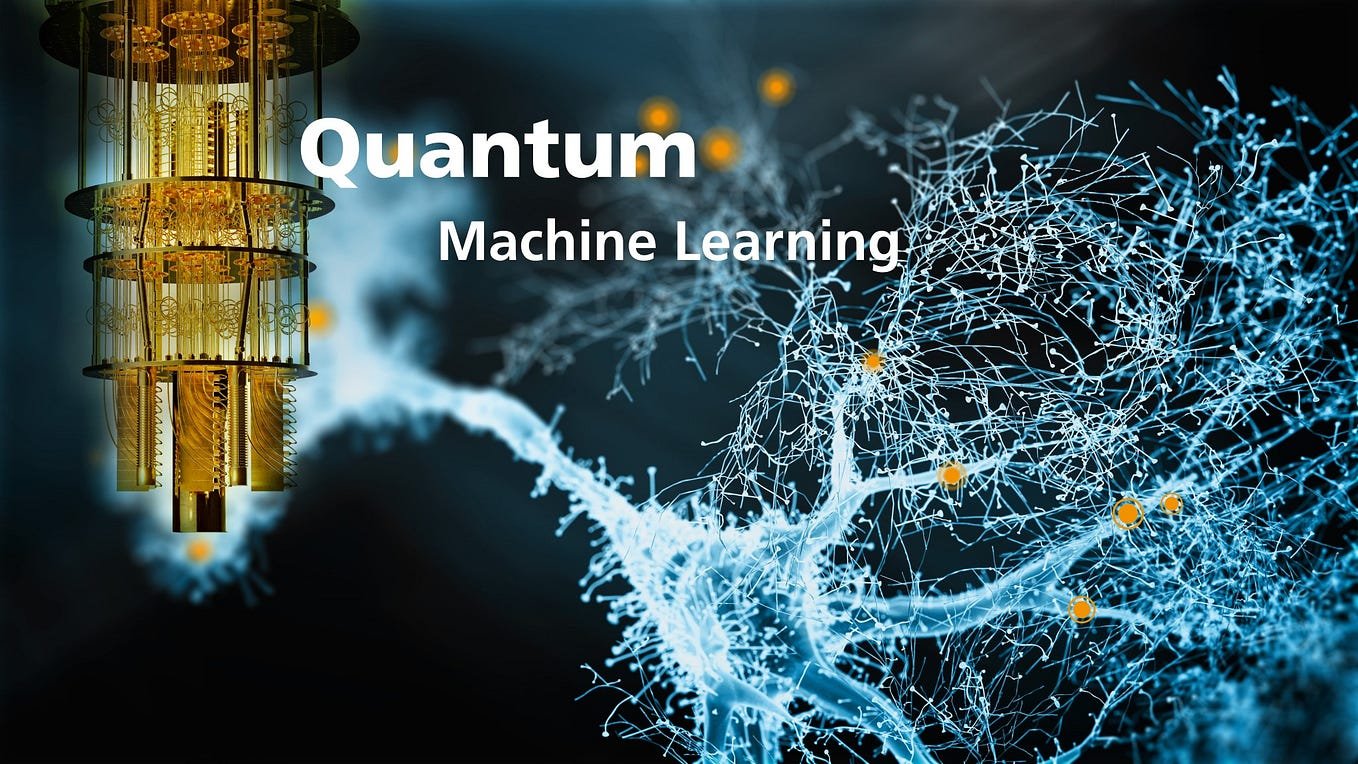
Quantum machine learning algorithms represent a new paradigm in computational intelligence, leveraging quantum properties to potentially achieve exponential advantages over classical approaches. These algorithms exploit quantum phenomena like superposition and entanglement to process information in fundamentally different ways, opening possibilities for solving previously intractable machine learning problems.
Variational Quantum Algorithms (VQAs) form the cornerstone of current quantum machine learning research. These hybrid quantum-classical algorithms use quantum circuits with adjustable parameters to solve optimization problems. The Variational Quantum Classifier (VQC) adapts classical support vector machines to quantum systems, while the Quantum Neural Network (QNN) implements neural network concepts using quantum gates. These approaches show promise for pattern recognition and data classification tasks.
Quantum Support Vector Machines (QSVM) offer potential quadratic speedups for certain classification problems by mapping data into high-dimensional quantum feature spaces. The quantum kernel method allows for efficient computation of similarity measures between data points in exponentially large quantum Hilbert spaces, potentially revealing patterns invisible to classical algorithms. This capability makes QSVM particularly attractive for complex data analysis tasks.
Quantum Principal Component Analysis (QPCA) provides exponential speedup for dimensionality reduction tasks under specific conditions. By encoding classical data into quantum states, QPCA can extract principal components from high-dimensional datasets much faster than classical methods. This quantum algorithm shows particular promise for preprocessing large datasets before feeding them into machine learning models.
Quantum Clustering Algorithms like Quantum K-Means leverage quantum properties to potentially achieve quadratic speedups in finding optimal cluster assignments. These algorithms use quantum amplitude estimation and quantum search techniques to identify data groupings more efficiently than classical approaches. The quantum advantage becomes more pronounced as dataset sizes and dimensionality increase.
Quantum Reinforcement Learning combines quantum computing with reinforcement learning paradigms, potentially accelerating policy optimization and value function estimation. Quantum algorithms can explore multiple action sequences simultaneously through superposition, while quantum interference can amplify rewards for optimal strategies. This approach shows promise for complex AI optimization problems in robotics, game playing, and autonomous systems.
Potential Applications and Use Cases
Quantum AI applications span numerous industries, offering transformative solutions to complex problems that challenge classical computing systems. The unique capabilities of quantum-enhanced AI create opportunities for breakthroughs in fields ranging from drug discovery to financial modeling, where classical approaches face fundamental limitations.
Drug Discovery and Pharmaceutical Research represents one of the most promising applications for quantum AI. Quantum computers can naturally simulate molecular interactions at the quantum level, while AI algorithms can analyze vast chemical databases to identify promising drug candidates. Quantum machine learning models can predict molecular properties, drug-target interactions, and side effects with unprecedented accuracy, potentially reducing drug development timelines from decades to years.
Financial Modeling and Risk Analysis benefit significantly from quantum computing capabilities. Portfolio optimization, risk assessment, and derivative pricing involve complex mathematical calculations that quantum algorithms can accelerate. Quantum AI systems can analyze market patterns, predict financial trends, and optimize trading strategies by processing multiple scenarios simultaneously through quantum superposition, providing competitive advantages in high-frequency trading environments.
Cryptography and Cybersecurity face both opportunities and challenges from quantum technologies. While quantum computers threaten current encryption methods through Shor’s algorithm, quantum AI can enhance cybersecurity through quantum-resistant cryptographic protocols and advanced threat detection systems. Machine learning enhanced with quantum capabilities can identify sophisticated cyberattacks and develop adaptive security measures.
Climate Modeling and Environmental Science require processing enormous datasets and complex simulations that strain classical computing resources. Quantum AI can accelerate climate predictions, optimize renewable energy distribution, and model environmental changes with greater accuracy. These capabilities are crucial for addressing climate change challenges and developing sustainable technologies.
Materials Science and Manufacturing benefit from quantum computing’s ability to simulate atomic and molecular interactions. Quantum AI can discover new materials with desired properties, optimize manufacturing processes, and predict material behavior under various conditions. This application is particularly valuable for developing advanced semiconductors, superconductors, and energy storage materials.
Logistics and Supply Chain Optimization involve complex routing and scheduling problems that quantum algorithms can solve more efficiently. Quantum AI systems can optimize delivery routes, manage inventory levels, and coordinate supply chain operations across global networks, reducing costs and improving efficiency for businesses worldwide.
Challenges and Limitations
Despite its tremendous promise, quantum AI faces significant technical and practical challenges that must be overcome before widespread adoption becomes possible. These limitations span hardware constraints, algorithmic complexity, and practical implementation issues that researchers and engineers are actively working to address.
Quantum Hardware Limitations represent the most immediate challenges for quantum AI development. Current quantum computers suffer from high error rates, limited coherence times, and small qubit counts that restrict the complexity of problems they can solve. Quantum decoherence causes quantum states to collapse due to environmental interference, while quantum noise introduces errors that accumulate during computation, limiting the reliability of quantum algorithms.
Error Correction and Fault Tolerance remain critical unsolved problems in quantum computing. Unlike classical computers with well-established error correction methods, quantum error correction requires complex encoding schemes that demand hundreds or thousands of physical qubits to create a single logical qubit. Current quantum processors lack sufficient scale and fidelity to implement robust error correction, limiting their practical applications.
Algorithmic Complexity and Quantum Advantage present theoretical challenges for quantum machine learning. Many proposed quantum AI algorithms require specific conditions to achieve speedups over classical methods, and the practical quantum advantage may be smaller than theoretical predictions suggest. Researchers must carefully identify problem domains where quantum approaches offer genuine benefits rather than marginal improvements.
Integration with Classical Systems poses significant engineering challenges for hybrid quantum-AI applications. Quantum computers operate under entirely different principles than classical systems, requiring specialized interfaces, calibration procedures, and programming paradigms. Developing seamless integration between quantum and classical components demands interdisciplinary expertise in quantum physics, computer science, and artificial intelligence.
Scalability and Resource Requirements limit the practical deployment of quantum AI systems. Current quantum computers require extreme operating conditions, including near-absolute-zero temperatures and electromagnetic shielding. These requirements make quantum technology expensive and accessible only to well-funded research institutions and technology companies, potentially limiting innovation and commercial applications.
Talent Shortage and Expertise Gap constrain the development of quantum AI applications. The field requires a deep understanding of quantum physics, advanced mathematics, and computer science, creating a small pool of qualified researchers and engineers. Educational institutions struggle to develop appropriate curricula, while industry faces challenges recruiting and training personnel for quantum computing roles.
Future Prospects and Timeline
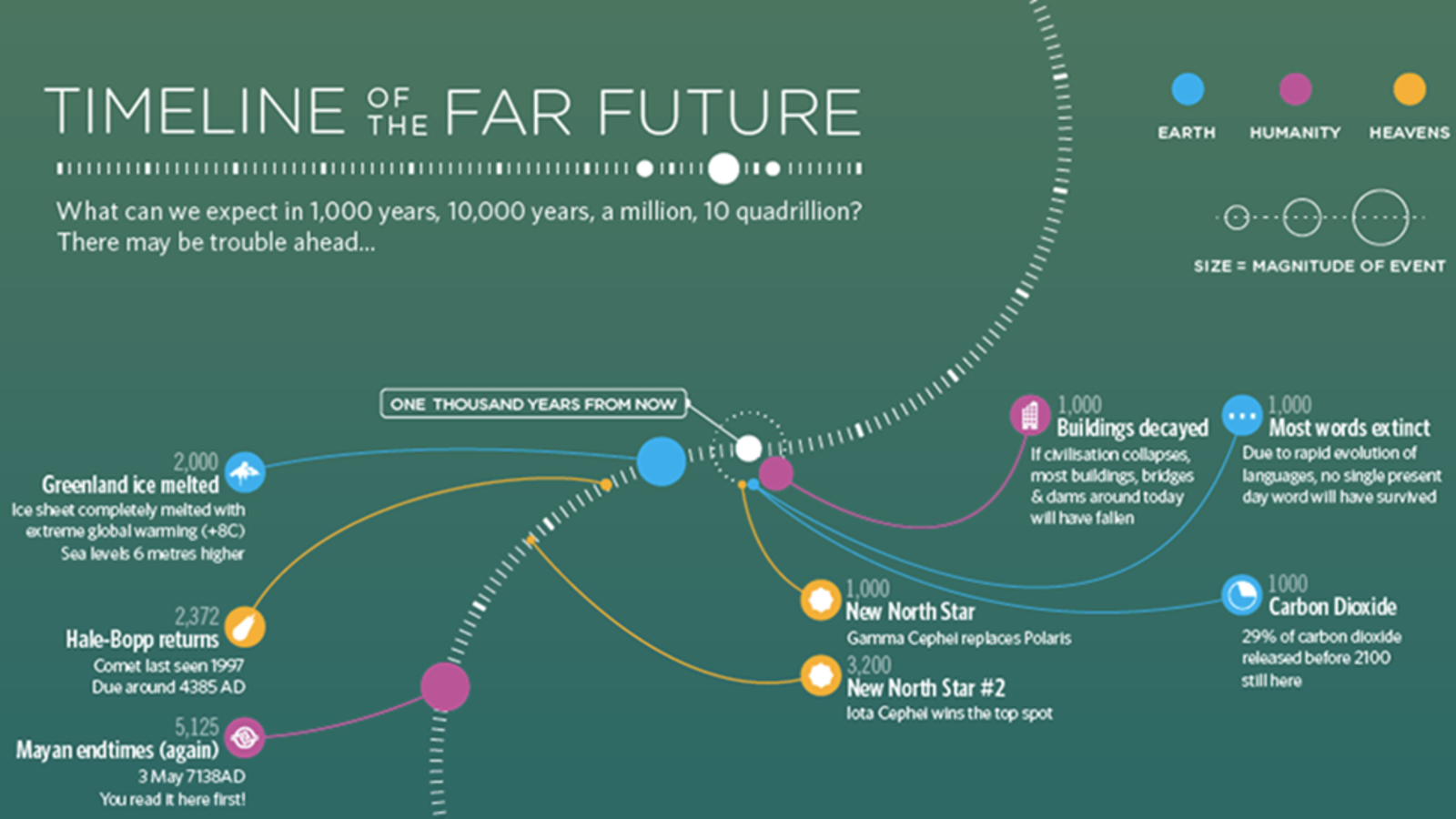
The future of quantum AI holds extraordinary promise, with researchers and industry experts predicting transformative breakthroughs over the next decade. Quantum computing’s impact on AI and ML in 2024 signifies a leap forward in computational capabilities, with continued efforts toward quantum supremacy where quantum computers outperform classical supercomputers on specific tasks.
Short-term Developments (2025-2030) will likely focus on hybrid quantum-classical systems that leverage the strengths of both computing paradigms. NISQ-era quantum computers will demonstrate practical advantages in specific AI applications such as optimization problems, quantum chemistry simulations, and certain machine learning tasks. Expect significant progress in quantum error correction and increased qubit counts that enable more complex quantum algorithms.
Medium-term Advancements (2030-2040) may witness the emergence of fault-tolerant quantum computers capable of sustained, error-free calculations. These systems will enable more sophisticated quantum machine learning algorithms and broader AI applications. Quantum neural networks may achieve practical advantages over classical approaches in pattern recognition and data analysis, while quantum AI begins transforming industries like pharmaceuticals, finance, and materials science.
Long-term Transformation (2040 and Beyond) could bring fully realized quantum artificial intelligence systems that revolutionize computational capabilities. Universal quantum computers may enable AI breakthrough applications currently impossible with classical systems. Quantum AI could accelerate scientific discovery, enable new forms of artificial creativity, and solve global challenges in climate change, energy, and healthcare.
Industry Milestones and Investments indicate strong momentum in quantum AI development. Major technology companies continue investing billions in quantum research, while governments worldwide launch national quantum initiatives. The race for quantum supremacy drives rapid hardware improvements, while growing patent portfolios and academic publications demonstrate increasing innovation in quantum computing applications.
Commercial Viability Timeline suggests practical quantum AI applications may emerge within the next 5-10 years for specialized use cases. As quantum hardware becomes more reliable and accessible, cloud-based quantum computing services will democratize access to quantum AI capabilities. Early adopters in finance, pharmaceuticals, and logistics may gain competitive advantages through strategic quantum technology investments.
Societal Impact Predictions encompass both opportunities and challenges as quantum AI matures. While these technologies promise to solve complex global problems and accelerate scientific progress, they may also disrupt existing industries and create new forms of digital divide between quantum-enabled and traditional organizations.
Industry Impact and Real-World Examples
The transformative potential of quantum AI is already manifesting across various industries, with pioneering companies and research institutions developing practical applications that demonstrate the technology’s commercial viability. These early implementations provide valuable insights into how quantum computing will revolutionize business operations and competitive landscapes.
Revolutionize AI Technology includes companies like Google, IBM, and Microsoft that have made substantial investments in quantum research. Google Quantum AI’s latest state-of-the-art quantum chip, Willow, represents a big step towards developing a large-scale, error-corrected quantum computer. IBM’s Quantum Network provides cloud access to quantum computers, enabling researchers and businesses to experiment with quantum machine learning algorithms without massive capital investments.
Pharmaceutical and Healthcare Applications showcase some of the most promising quantum AI implementations. Companies like Merck and Johnson & Johnson collaborate with quantum computing firms to accelerate drug discovery processes. Quantum algorithms can simulate molecular interactions at unprecedented scales, while AI models analyze quantum simulation results to identify promising therapeutic compounds. This combination potentially reduces drug development costs by billions of dollars and accelerates time-to-market for life-saving medications.
Financial Services Transformation demonstrates quantum AI’s impact on trading, risk management, and fraud detection. JPMorgan Chase and Goldman Sachs experiment with quantum computing for portfolio optimization and derivatives pricing. Quantum machine learning models can analyze market patterns and risk factors more comprehensively than classical approaches, potentially providing significant competitive advantages in high-frequency trading and algorithmic investment strategies.
Automotive and Transportation Innovation leverages quantum AI for autonomous vehicle development and traffic optimization. Companies like Volkswagen and Toyota investigate quantum algorithms for route optimization and battery design. Quantum-enhanced AI systems can process real-time traffic data, weather conditions, and vehicle sensor information to optimize autonomous driving decisions and improve transportation efficiency.
Energy and Climate Solutions utilize quantum AI for renewable energy optimization and climate modeling. Google’s DeepMind collaborates with quantum researchers to improve energy efficiency in data centers, while utilities explore quantum computing for smart grid optimization. Quantum machine learning models can predict energy demand patterns, optimize renewable energy distribution, and accelerate the development of advanced materials for solar panels and batteries.
Manufacturing and Supply Chain Optimization benefit from quantum AI applications in production planning and logistics. Companies like Airbus and BMW experiment with quantum algorithms for supply chain optimization and quality control. Quantum-enhanced AI can simultaneously consider multiple variables in manufacturing processes, optimizing production schedules, inventory management, and distribution networks with greater efficiency than classical systems.
More Read: Why AI Startups Are Disrupting Traditional Industries Faster Than Ever
Conclusion
Quantum computing and artificial intelligence convergence represents one of the most significant technological developments of our time, promising to revolutionize computational capabilities across industries and scientific disciplines. The fusion of quantum algorithms with machine learning techniques creates unprecedented opportunities for solving complex problems that remain intractable for classical computing systems, from drug discovery and financial modeling to climate simulation and materials science.
While current quantum AI applications face substantial challenges, including hardware limitations, error rates, and integration complexity, the rapid pace of innovation suggests that practical quantum-enhanced AI systems will emerge within the next decade. Major technology companies, research institutions, and governments worldwide are investing billions in quantum research, driving breakthroughs in quantum error correction, algorithm development, and hybrid quantum-classical architectures.
As quantum processors become more sophisticated and quantum machine learning algorithms mature, we can expect transformative applications that democratize access to computational power previously reserved for the most advanced supercomputers, ultimately ushering in a new era of scientific discovery and technological innovation that will reshape our understanding of what’s computationally possible.



